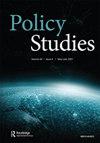俄乌战争对欧盟货币的影响:高频分析
IF 2.3
4区 管理学
Q2 PUBLIC ADMINISTRATION
引用次数: 0
摘要
摘要本文考察了持续的乌克兰-俄罗斯战争如何影响五种欧盟货币(波兰兹罗提、匈牙利福林、捷克克朗、瑞典克朗和罗马尼亚列伊)的估值,利用高频时间序列数据和先进的统计模型,我们分析了从2013年1月1日到2023年2月24日的522周期间,以2022年2月24日为关键焦点。俄乌战争对非欧元区国家的货币产生了不同的影响。波兰、匈牙利和瑞典受到了重大影响,而捷克和罗马尼亚保持相对稳定。我们的研究还强调了欧元作为储备货币的稳定性,它在危机时期吸引投资者,并保护参与经济体免受货币波动的影响。此外,我们的分析强调了战争对这些货币的独特影响,受到其独特的政治、经济和金融结构和优势的影响。JEL CODE: d60o40o50关键词:汇率欧洲货币贝叶斯披露声明作者未报告潜在的利益冲突。注1 USD/当地货币(例如USD/PLN)平价是对本研究中使用的每种货币实施的为了确保研究结果的可靠性和一致性,我们使用每月的数据进行了额外的分析。这些补充分析再次证实了本文结果的稳健性和稳定性。本文作者mahmut Zeki Akarsu是华沙大学经济学博士候选人。他的研究重点是宏观经济因素与不平等之间的关系,以及重大政治事件如何影响货币。曾在《全球社会政策》、《知识经济》、《经济学》等杂志上发表论文。本文作者是蒙特克莱尔州立大学经济学助理教授。她在纽约城市大学获得博士学位。主要研究方向为应用计量经济学、统计学和劳动经济学。本文章由计算机程序翻译,如有差异,请以英文原文为准。
The impact of the Russia-Ukraine War on European Union currencies: a high-frequency analysis
ABSTRACTThis article examines how the ongoing Ukraine-Russia war has affected the valuation of five European Union currencies: the Polish Zloty, Hungarian Forint, Czech Koruna, Swedish Krone, and Romanian Leu. Using high-frequency time series data and advanced statistical models, we analyze a 522-week period from 1 January 2013, to 24 February 2023, with 24 February 2022, as a key focal point. The Russia-Ukraine war had varying effects on the currencies of non-Eurozone countries. Poland, Hungary, and Sweden experienced significant impacts, while Czechia and Romania remained relatively stable. Our research also highlights the stability of the Euro as a reserve currency, which attracts investors during times of crisis and protects participating economies from currency fluctuations. Additionally, our analysis underscores the distinct impact of war on these currencies, influenced by their unique political, economic, and financial structures and strengths.JEL CODE: D60O40O50KEYWORDS: Exchange ratecurrencyEuropeWarBayesian Disclosure statementNo potential conflict of interest was reported by the author(s).Notes1 USD/local currency (e.g. USD/PLN) parity is implemented for every currency that is used in this study.2 To ensure the reliability and consistency of our findings, we conducted additional analyses using monthly data. These supplementary analyses reaffirm the robustness and stability of the results presented in this article.Additional informationNotes on contributorsMahmut Zeki AkarsuMahmut Zeki Akarsu is a Ph.D. candidate in economics at the University of Warsaw. His research focuses on relationships between macroeconomics factors and inequality, and how big political events affect currencies. His some papers have been published in Global Social Policy, Knowledge Economy, and Ekonomika.Orkideh GharehgozliOrkideh Gharehgozli is an assistant professor in economics at Montclair State University. She otained her Ph.D. from City University of New York. Her research focuses on applied econometrics, statistics and labor economics.
求助全文
通过发布文献求助,成功后即可免费获取论文全文。
去求助
来源期刊

Policy Studies
PUBLIC ADMINISTRATION-
CiteScore
5.40
自引率
4.50%
发文量
34
期刊介绍:
These changes at the structural level of the global system have impacted upon the work of public organizations either directly or indirectly and have broadened the field of action in policy studies. It has five main areas of intellectual interest: 1.To broaden the lens of policy analysis through the publication of research which locates policy-making within a theoretical, historical or comparative perspective. 2.To widen the field of enquiry in policy analysis through the publication of research that examines policy issues in a British, comparative, international or global context. 3.To promote constructive debate on theoretical, methodological and empirical issues in policy analysis.
 求助内容:
求助内容: 应助结果提醒方式:
应助结果提醒方式:


